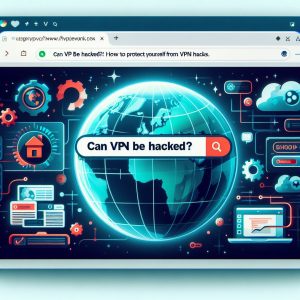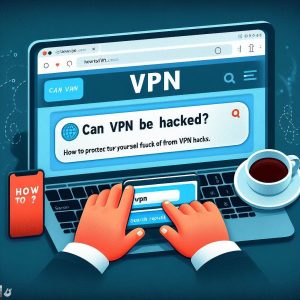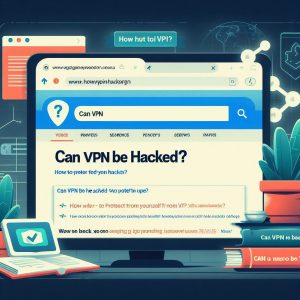Introduction
A virtual private network (VPN) is an encrypted connection over the internet that allows users to securely access a private network and share data remotely. VPNs work by creating a secure, encrypted tunnel for your data and online activity between your device and the VPN server. This protects your sensitive information and browsing data from being snooped on or modified over less-secured public Wi-Fi and cellular connections.
In today’s digital world, VPNs have become very important for protecting our privacy and sensitive information online. We routinely connect to public Wi-Fi hotspots where hackers could secretly access our devices. VPN encryption ensures that our data remains secure and private while traveling through these types of insecure networks. As more of our personal and professional lives happen online, VPNs provide essential protection.
However, like any security technology, VPNs have vulnerabilities that attackers could exploit to break into the encrypted tunnel and view or modify data. Understanding these vulnerabilities is key for protecting yourself while using a VPN.
Vulnerabilities in VPNs
While VPN services provide much greater privacy and security compared to unprotected web browsing, no method is completely foolproof. Intruders are constantly probing VPN infrastructure, encryption, and connected devices for weaknesses they can exploit to break into VPN connections.
Some examples of vulnerabilities that have affected VPN users in the past:
Unsecured VPN apps and software bugs: Flaws in VPN app code or accidental data leaks have allowed attackers to bypass VPN protections, view user activity, and collect sensitive data. Vulnerabilities have been found in both custom VPN software and third party apps like OpenVPN. Keeping all apps fully updated is key.
Weak encryption algorithms: Strong encryption like AES 256-bit is essential for securing VPN tunnels. Some providers have used outdated or insecure algorithms like Blowfish that are easier for hackers to crack. The encryption methods used by a VPN provider should be fully disclosed.
VPN protocol vulnerabilities: Differing protocols that underpin VPN technology (e.g. IKEv2, OpenVPN) have all faced vulnerabilities allowing attackers to decrypt and access data. Keeping desktop and mobile VPN apps updated with the latest protocols is important.
Insecure default settings: VPN apps don’t always ship with the most secure default settings. Attackers exploit these weaker default options to intercept traffic and data. Customizing settings for greater security is advised.
DNS, IPv6, and WebRTC leaks: VPN apps don’t always protect against all potential data leak risks by default. DNS requests, IPv6 traffic, or WebRTC data could get exposed beyond the VPN tunnel, allowing snooping on user activity/location. Using comprehensive leak protection is key.
The sheer variety of ways attackers have devised to pierce VPN security highlights why vigilance is necessary on behalf of both VPN providers and users.

Factors Affecting VPN Security
The security of any VPN connection depends on a variety of factors related to user behavior, the system configurations involved, and the policies of the VPN service itself.
User Behavior
How VPN users behave plays a major role in determining vulnerability to attacks:
- Using public Wi-Fi networks without a VPN is extremely insecure as attackers can silently access devices and data on an unprotected hotspot. Always use VPN protection on open networks.
- Insecure site logins transmitted through the VPN tunnel (especially when using public networks) could allow attackers to steal credentials by intercepting data within the tunnel if unsuccessful MITM attacks occur. Avoid logging into sensitive accounts.
- Accidentally disabling the VPN connection while browsing can expose your true IP address and online activity. Ensure the VPN stays active at all times when in use.
- Committing passwords or confidential data to email or storage while connected could lead to compromise if the VPN is somehow breached. Remember the VPN tunnel alone does not provide 100% fullproof security.
- Reusing passwords across multiple accounts remains dangerous even when a VPN is used. Your other online accounts could be put at risk if a single site is compromised. Unique passwords for every account is recommended.
- Outdated devices, software and apps can allow attackers access to exploits that could circumvent VPN-level protections. Maintaining defenses at all levels is key.
VPN Provider Practices
The security assurances implemented by the VPN provider itself also greatly impact safety:
- Server infrastructure security is crucial for preventing unauthorized data access. VPN servers should be frequently evaluated for vulnerabilities and kept fully patched. End-to-end encryption should protect data even if servers are compromised.
- Strict no-logs policies prevent sensitive user data from being collected in the first place. VPN providers should not be recording browsing data, timestamps, IP addresses, or any user activity while the VPN is active.
- Strong encryption protocols like OpenVPN, IKEv2 and Wireguard provide the strongest defenses for creating secure VPN tunnels difficult for intruders to breach. Proprietary protocols could have hidden vulnerabilities.
- VPN server network diversity makes tracing activity back to a user’s true location/identity more difficult. More countries and locations the servers are based in, the better.
- Firewall and filter protections can prevent malicious traffic, geoIP leaks, IPv6 leaks, WebRTC leaks and other identifying data seepage while the VPN is active. All traffic should be forced through the encrypted tunnel exclusively.
- Updated VPN apps/software that address the latest vulnerabilities should be maintained across all user platforms. Fixed security issues can’t benefit users otherwise.
Paying close attention to the specific security practices and policies of a VPN provider is advised before establishing an account.
Encryption & Protocols
The encryption cipher strength and VPN protocols used when creating the secure tunnels between devices also impacts the resilience to hacking:
- AES 256-bit encryption is presently considered uncrackable by brute force attacks. Servers should always leverage AES-256 bit for protecting data transmission whenever possible.
- Additional obfuscation layers like multi-hop connections between servers, or scrambling source data via hashing algorithms improves encryption strength even further against analysis attacks.
- OpenVPN protocol is presently considered the most secure, open source protocol available used by both free and paid VPN services. It relies on highly secure 256-bit SSL/TLS encryption.
- IKEv2/IPSec protocol is also considered highly secure and offers great connection speeds. It is supported on most modern devices without additional apps required. Not an open protocol however so more vulnerability audits are necessary.
- WireGuard® protocol is emerging as a promising new open source protocol focused on better connection speeds and ease-of-use. More third party audits over time will help identify any encryption vulnerabilities needing improvement.
Scrutinizing the protocols and ciphers used by VPN providers yields the technical assurances that encryption measures offer strong protection against unauthorized data access by hackers or other groups.

Common Attacks on VPNs
Despite stringent security precautions by VPN services, several sophisticated attack techniques still threaten VPN users including:
Man-In-The-Middle (MITM) Attacks
These attacks infiltrate the communication channel between a user’s device and the VPN servers. Attackers covertly intercept traffic in real-time, allowing not only data access but also the ability to modify or block traffic. Common approaches include:
- Downgrade attacks – Manipulate the encrypted handshake between VPN client and server to force usage of weaker encryption than typically provided.
- Packet injection – Insert malicious data into VPN traffic, which gets mistakenly interpreted as legitimate data by the receiving system.
- SSL hijacking – Exploits vulnerabilities in SSL certificate verification to masquerade as the intended VPN endpoint for a user’s device.
MITM attacks pose serious threats as users may believe their VPN connection retains full security while an attacker silently compromises it.
Phishing Attacks
Deceiving users into surrendering login credentials is a common tactic against VPN consumers. Tactics include:
- Fake VPN provider websites covertly capture user passwords and payment details.
- Phishing emails mimic alerts from VPN providers to capture account data. Links direct to phishing sites.
- Popup login prompts injected into websites compromise credentials entered into the fake VPN login window.
Staying vigilant for subtle signs of fraud within emails, ads or websites can protect against phishing schemes.
Malware Infections
Similarly devious tactics used for typical malware campaigns can also target VPN users specifically:
- Fake VPN app downloads contain Trojans or spyware that compromise data
- Poisoned search rankings promote infected, fraudulent VPN downloads
- Malicious browser extensions masquerade as VPN services to gather browsing data
- Weaponized email attachments install data-stealing implants onto systems
Ensuring VPN apps and software downloads originate purely from trusted sources reduces users’ risks.
DDoS Attacks
There are also infrastructure-level threats to VPN services themselves. A common one is Distributed Denial-of-Service (DDoS) attacks aimed at VPN servers which involve:
- Using botnets of compromised devices to flood servers with junk traffic
- Exploiting Internet protocols like UDP amplification to overwhelm targets
- Leveraging reflection techniques to obscure true attack source
The end result is VPN servers get so overwhelmed that legitimate user connections get denied, resulting in service outages.
How to Protect Yourself from VPN Hacks
Despite the various threats enumerated, there are also clear ways VPN users can protect themselves:
Choosing a Reliable VPN Provider
Evaluating provider security & responsibility:
- Privately audited with no major vulnerabilities detected
- Strict zero logging policies, lacking potential user insights
- Implements strong AES-256 data encryption
- Supports only the most secure VPN protocols
- Vigilance around server, infrastructure security and DDoS resilience
- Responsive updates to address any newfound issues
Scrutinizing such factors during provider selection makes interception significantly more difficult.
Using Strong Passwords
Creating unique, randomized passwords for the VPN account itself further isolates it from any other Internet account whose compromise could put your VPN usage at risk.
Password manager tools facilitate securely generating and storing robust passwords for improved safety.
Enabling Two-Factor Authentication
Expanding account login requirements to include one-time codes from a separate mobile device enhances security against password-based attacks.
Even stolen VPN credentials then have severely limited exploitability against the additional authentication factor required at each new login.
Keeping Software Updated
Desktop VPN clients and mobile apps should have auto-updates enabled to quickly install any security fixes released. Updates prevent exploits for vulnerabilities that arise over time.
Actively checking for updates periodically is wise as well for users lacking auto-update functionality currently. Out-of-date VPN software risks the chance of a newly found exploit which is then leveraged by intruders before patches are available.
Avoiding Public Wi-Fi
Completing sensitive activities like online shopping, banking or accessing proprietary systems is best avoided altogether on public networks even when connected through a VPN.
The risks posed by advanced threats like MITM attacks capable of compromising VPN tunnels highlight why truly sensitive communications are wisely limited to secure private internet connections exclusively.
For more casual browsing activities, keeping the VPN enabled still raises the difficulty of linking online behaviors to personal identity. But users should limit private data access.

Conclusion
While extremely useful technologies, understanding the potential security vulnerabilities around virtual private networks is imperative for users to remain protected. VPN services greatly improve upon the outright risks of open Wi-Fi networks. However, no solution yet guarantees 100% data security.
Ensuring providers implement up-to-date security protocols and infrastructure hardening are absolute requirements. Meanwhile users also need to leverage strong system-wide protections as well – unique passwords, updated devices and software plus avoidance of directly accessing extremely sensitive accounts on public networks.
Combining prudent steps by both VPN companies and individuals substantially raises the complexity for most attack vectors. Being proactive around identifying newly reported vulnerabilities allows users and businesses to respond quickly and avoid exploited threats. Remaining vigilant to improve security over time is key for reducing VPN attack surface. Addressing risks that do emerge through provider advisories or media reports also guarantees the fastest mitigation against issues before incidents can occur.
Ultimately VPNs will remain extremely beneficial technologies for the enhanced privacy and access controls they facilitate. Through continually optimizing protections – keeping infrastructure secured, software updated and users well educated – VPN services can fulfill their purpose of granting secure remote network access for both individual and commercial needs in the face of near-constant threats from intruders. Combining knowledge with proactive protections ensure VPNs retain trustworthiness as indispensable online privacy tools, keeping sensitive data transmission secured against unauthorized access.